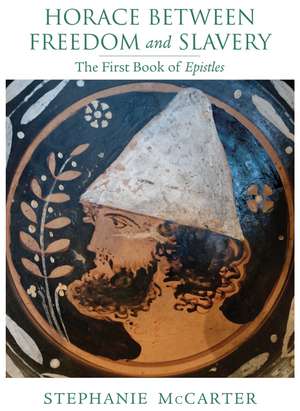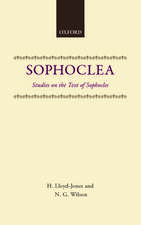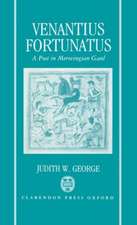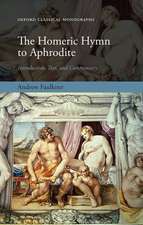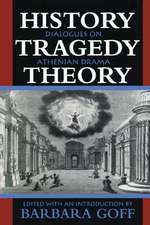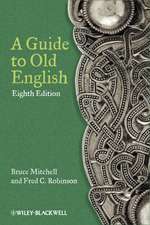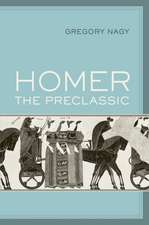Horace between Freedom and Slavery: The First Book of <i>Epistles</i>: Wisconsin Studies in Classics
Autor Stephanie McCarteren Limba Engleză Hardback – 7 dec 2015
During the Roman transition from Republic to Empire in the first century B.C.E., the poet Horace found his own public success in the era of Emperor Augustus at odds with his desire for greater independence. In Horace between Freedom and Slavery, Stephanie McCarter offers new insights into Horace's complex presentation of freedom in the first book of his Epistles and connects it to his most enduring and celebrated moral exhortation, the golden mean.
She argues that, although Horace commences the Epistles with an uncompromising insistence on freedom, he ultimately adopts a middle course. She shows how Horace explores in the poems the application of moderate freedom first to philosophy, then to friendship, poetry, and place. Rather than rejecting philosophical masters, Horace draws freely on them without swearing permanent allegiance to any—a model for compromise that allows him to enjoy poetic
renown and friendships with the city's elite while maintaining a private sphere of freedom. This moderation and adaptability, McCarter contends, become the chief ethical lessons that Horace learns for himself and teaches to others. She reads Horace's reconfiguration of freedom as a political response to the transformations of the new imperial age.
She argues that, although Horace commences the Epistles with an uncompromising insistence on freedom, he ultimately adopts a middle course. She shows how Horace explores in the poems the application of moderate freedom first to philosophy, then to friendship, poetry, and place. Rather than rejecting philosophical masters, Horace draws freely on them without swearing permanent allegiance to any—a model for compromise that allows him to enjoy poetic
renown and friendships with the city's elite while maintaining a private sphere of freedom. This moderation and adaptability, McCarter contends, become the chief ethical lessons that Horace learns for himself and teaches to others. She reads Horace's reconfiguration of freedom as a political response to the transformations of the new imperial age.
Din seria Wisconsin Studies in Classics
-
 Preț: 71.93 lei
Preț: 71.93 lei -
 Preț: 357.07 lei
Preț: 357.07 lei -
 Preț: 160.09 lei
Preț: 160.09 lei -
 Preț: 321.58 lei
Preț: 321.58 lei -
 Preț: 116.93 lei
Preț: 116.93 lei -
 Preț: 58.57 lei
Preț: 58.57 lei -
 Preț: 208.26 lei
Preț: 208.26 lei -
 Preț: 238.93 lei
Preț: 238.93 lei -
 Preț: 322.99 lei
Preț: 322.99 lei -
 Preț: 403.33 lei
Preț: 403.33 lei -
 Preț: 149.95 lei
Preț: 149.95 lei -
 Preț: 66.23 lei
Preț: 66.23 lei -
 Preț: 118.67 lei
Preț: 118.67 lei -
 Preț: 306.60 lei
Preț: 306.60 lei -
 Preț: 229.03 lei
Preț: 229.03 lei -
 Preț: 310.57 lei
Preț: 310.57 lei -
 Preț: 336.39 lei
Preț: 336.39 lei -
 Preț: 258.86 lei
Preț: 258.86 lei -
 Preț: 153.95 lei
Preț: 153.95 lei -
 Preț: 428.40 lei
Preț: 428.40 lei -
 Preț: 429.75 lei
Preț: 429.75 lei -
 Preț: 227.80 lei
Preț: 227.80 lei -
 Preț: 506.04 lei
Preț: 506.04 lei -
 Preț: 247.73 lei
Preț: 247.73 lei -
 Preț: 402.76 lei
Preț: 402.76 lei - 15%
 Preț: 476.54 lei
Preț: 476.54 lei -
 Preț: 178.13 lei
Preț: 178.13 lei -
 Preț: 257.29 lei
Preț: 257.29 lei -
 Preț: 119.03 lei
Preț: 119.03 lei -
 Preț: 166.72 lei
Preț: 166.72 lei -
 Preț: 187.37 lei
Preț: 187.37 lei -
 Preț: 199.67 lei
Preț: 199.67 lei -
 Preț: 218.12 lei
Preț: 218.12 lei - 23%
 Preț: 608.98 lei
Preț: 608.98 lei - 23%
 Preț: 589.87 lei
Preț: 589.87 lei -
 Preț: 347.37 lei
Preț: 347.37 lei -
 Preț: 305.89 lei
Preț: 305.89 lei -
 Preț: 122.89 lei
Preț: 122.89 lei -
 Preț: 177.37 lei
Preț: 177.37 lei - 23%
 Preț: 591.20 lei
Preț: 591.20 lei -
 Preț: 160.48 lei
Preț: 160.48 lei -
 Preț: 258.14 lei
Preț: 258.14 lei -
 Preț: 258.25 lei
Preț: 258.25 lei - 23%
 Preț: 450.63 lei
Preț: 450.63 lei - 23%
 Preț: 709.57 lei
Preț: 709.57 lei -
 Preț: 502.03 lei
Preț: 502.03 lei -
 Preț: 246.80 lei
Preț: 246.80 lei
Preț: 478.78 lei
Preț vechi: 563.27 lei
-15% Nou
Puncte Express: 718
Preț estimativ în valută:
91.61€ • 95.65$ • 75.82£
91.61€ • 95.65$ • 75.82£
Carte tipărită la comandă
Livrare economică 04-18 aprilie
Preluare comenzi: 021 569.72.76
Specificații
ISBN-13: 9780299305703
ISBN-10: 0299305708
Pagini: 384
Dimensiuni: 152 x 229 x 25 mm
Greutate: 0.66 kg
Ediția:1
Editura: University of Wisconsin Press
Colecția University of Wisconsin Press
Seria Wisconsin Studies in Classics
ISBN-10: 0299305708
Pagini: 384
Dimensiuni: 152 x 229 x 25 mm
Greutate: 0.66 kg
Ediția:1
Editura: University of Wisconsin Press
Colecția University of Wisconsin Press
Seria Wisconsin Studies in Classics
Recenzii
"McCarter's unpacking of Horace's philosophical thinking is a significant contribution to understanding his work and to the broader cultural picture of Roman engagement with Greek philosophical ideas and practices." —Catherine Connors, University of Washington
"A strong and consistent interpretation of a book of poetry as a whole. . . . Convincing."
—Phoenix
—Phoenix
Notă biografică
Stephanie McCarter is an associate professor of classical languages at Sewanee: The University of the South.
Cuprins
Acknowledgments
Abbreviations
Introduction
1 The Dilemma of Libertas in Epistles 1.1
2 Horace the Student: Inconsistency and Sickness in Epistles 1.1, 1.8, and 1.15
3 Horace the Teacher: Poetry and Philosophy in Epistles 1.1 and 1.2
4 Nil Admirari: The Moral Adviser of Epistles 1.4, 1.5, 1.6, and 1.12
5 Otia Liberrima: Horace, Maecenas, and the Sabine Farm in Epistles 1.7 and 1.16
6 The Limits of Rural Libertas: Epistles 1.10, 1.11, and 1.14
7 Moderate Freedom and Friendship: Epistles 1.17 and 1.18
8 Moderate Freedom and Poetry: Epistles 1.3 and 1.19
Conclusion: Freedom and Publication in Epistles 1.13 and 1.20
Notes
Bibliography
Index
Abbreviations
Introduction
1 The Dilemma of Libertas in Epistles 1.1
2 Horace the Student: Inconsistency and Sickness in Epistles 1.1, 1.8, and 1.15
3 Horace the Teacher: Poetry and Philosophy in Epistles 1.1 and 1.2
4 Nil Admirari: The Moral Adviser of Epistles 1.4, 1.5, 1.6, and 1.12
5 Otia Liberrima: Horace, Maecenas, and the Sabine Farm in Epistles 1.7 and 1.16
6 The Limits of Rural Libertas: Epistles 1.10, 1.11, and 1.14
7 Moderate Freedom and Friendship: Epistles 1.17 and 1.18
8 Moderate Freedom and Poetry: Epistles 1.3 and 1.19
Conclusion: Freedom and Publication in Epistles 1.13 and 1.20
Notes
Bibliography
Index
Descriere
This insightful study of the Roman poet Horace's first book of Epistles explores his representations of slavery and freedom as a response to the new imperial era in Rome.
